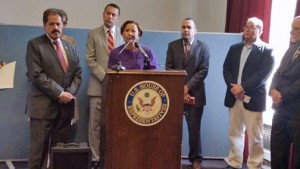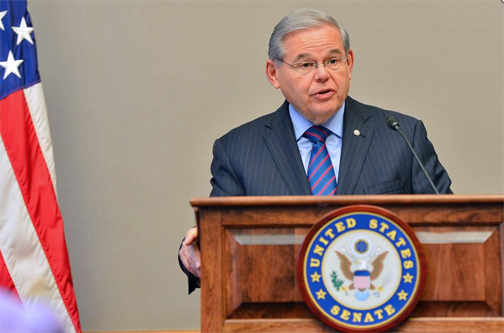PR Taskforce members call on Republicans to extend tax provisions for island


Dem. Reps. José Serrano (left) and Nydia Velázquez (at podium) were in the group that appealed to Republican leaders to help Puerto Rico.
With ongoing negotiations over tax reform, Members of the Congressional Hispanic Caucus Puerto Rico Taskforce sent a letter to Republican leaders in Congress urging the inclusion of tax provisions that will help rebuild Puerto Rico.
In the letter addressed to House Speaker Paul Ryan and Senate Majority Leader Mitch McConnell, four Democratic lawmakers said they were “sorely disappointed with the tax packages currently being considered in both the House and Senate.”
Reps. Nydia M. Velázquez (D-NY), José E. Serrano (D-NY), Luis V. Gutiérrez (D-IL), Raúl M. Grijalva (D-AZ), Darren Soto (D-FL), and Adriano Espaillat (D-NY) jointly stated that both bills “ignore the special circumstances facing the island as a Commonwealth of the United States, given that Puerto Rican residents cannot avail themselves of some of tax benefits provided to residents on the mainland.”
“While we support efforts to fix our broken tax code, both bills fail to provide enough relief to assist in Puerto Rico’s long-term recovery, and we strongly encourage additional provisions be included in both bills before final passage,” they said.
Specifically, they asked for permanency for the rum cover and Section 199 domestic manufacturing production credit for Puerto Rico, expand the child tax credit (CTC), extend the use of the earned income tax credit (EITC), and address problems for companies operating in Puerto Rico.
“We applaud the effort to include the now-expired cover-over of rum excise taxes to Puerto Rico and the U.S. Virgin Islands and the Section 199 tax credit for domestic manufacturing in Puerto Rico,” the four Hispanic lawmakers stated.
“However, as drafted, these provisions are only temporary and do not go far enough. To better meet the needs of the island, it is critical that you retroactively make permanent these two code sections,” they said.
The rum cover would provide budgetary support to the territorial governments, while the Section 199 credit would be another step toward job creation and economic growth in the territories, helping the island’s immediate recovery and long-term fiscal health, they added.
Puerto Rico and the USVI are charged a rum excise tax of $13.50 per proof gallon excise tax on distilled spirits produced in or imported into the United States. That expired Dec. 31, 2016, when the U.S. Treasury Department stopped giving back to the islands $13.25 per gallon. Now, the U.S. government sends back $10.50.
Last fiscal year, Puerto Rico received $358 million from the rum tax rebate, a figure that could have been $393 million had the full amount been reimbursed.
Meanwhile, the lawmakers asked that Puerto Rico be afforded the same tax relief that U.S. mainland residents get through the CTC, established in 1997 and is a critical tool to help lift families out of poverty by providing a refundable credit.
“Yet, only families in Puerto Rico with three or more children are eligible. As was recommended by the Bipartisan Congressional Task Force on Economic Growth in Puerto Rico, Section 24 of the Internal Revenue Code should be amended to allow for families with fewer than three children to claim the credit and for the more generous formula — the one available in all 50 states and the District of Columbia — to be used to calculate the amount of the refund payment,” the lawmakers said.
In addition to the CTC, the EITC is another method by which Congress can modify the tax code to benefit individuals and families in Puerto Rico, they added. The EITC has a substantial impact on families’ economic security and has been a proven financial incentive since its establishment in 1975.
“Unfortunately, Puerto Rico residents have never been granted the ability to utilize the EITC. The extension of EITC to Puerto Rico would boost labor force participation and consumer spending by rewarding the work of low-income families,” they noted.
They also discussed the downside to address a clause imposing a 20 percent tax on stateside companies importing goods from foreign corporations, which would include Puerto Rico operations.
“While it is admirable to reform the international tax system, the bills remove any existing incentives for multinational companies to invest in Puerto Rico; and therefore disregarding a central tenant of tax reform — encouraging domestic investment and employment,” they said.
“Because corporate income attributed to Puerto Rico operations is treated as foreign, the tax proposals impose excessive tax liabilities on companies that have proven their dedication to investing in their local operations and employees. Therefore, we recommend that Congress work to ensure that Puerto Rico is not harmed by changes made in the tax reform process,” the four lawmakers concluded.












